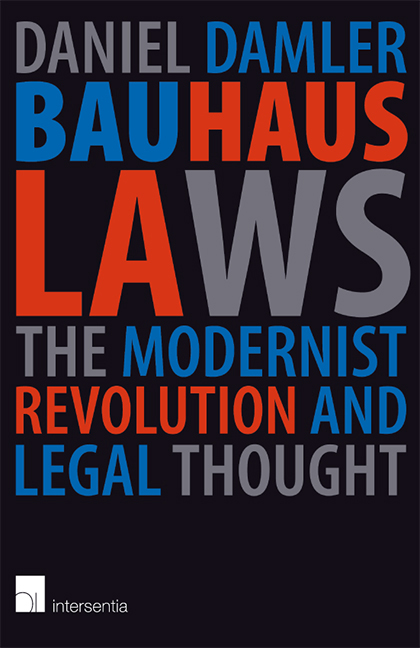Book contents
- Frontmatter
- Acknowledgements
- Contents
- Platonic Modernism: Introduction
- 1 Vienna 1900: Pure Legal Craftwork
- 2 Utopias Built with New Forms and Materials: Taut, Zamyatin, Le Corbusier
- 3 Hijacking Modernism: Bauhaus Values in the Third Reich
- 4 One-World Beauty: International Law and International Style
- 5 Regaining Sovereignty: “Transparency” in Postwar Germany
- Kandinsky's Laws: Epilogue
- About the Author
Platonic Modernism: Introduction
Published online by Cambridge University Press: 15 November 2019
- Frontmatter
- Acknowledgements
- Contents
- Platonic Modernism: Introduction
- 1 Vienna 1900: Pure Legal Craftwork
- 2 Utopias Built with New Forms and Materials: Taut, Zamyatin, Le Corbusier
- 3 Hijacking Modernism: Bauhaus Values in the Third Reich
- 4 One-World Beauty: International Law and International Style
- 5 Regaining Sovereignty: “Transparency” in Postwar Germany
- Kandinsky's Laws: Epilogue
- About the Author
Summary
On one thing they were agreed, the protagonists of Plato's dialogues The Republic and Laws : that the weal and woe of the community depended on the substance of childhood education, that the greatest care had to be taken to give the future elites of the ideal state a basic education in music and gymnastics, and that – conversely – the introduction of new musical compositions, dances and motoric skills had to be prevented at all costs. “Then, Glaucon”, we read in The Republic (401d), “is not musical education of paramount importance … because rhythm and harmony enter most powerfully into the innermost part of the soul and lay forcible hands upon it …? ”
In Laws (656d–657a), the Athenian praised as a shining example – “worthy in the highest degree of a statesman and a legislator” – the 10,000-year-old Egyptian custom
that the youth of a State should practice in their rehearsals postures and tunes that are good: these they prescribed in detail and posted up in the temples, and outside this official list it was, and still is, forbidden to painters and all other producers of postures and representations to introduce any innovation or invention, whether in such productions or in any branch of music, over and above the traditional forms.
Never praise new songs, it says elsewhere, in The Republic (424c): “[One] must beware of changing to a new kind of music, for the change always involves far-reaching danger. Any alteration in the modes of music is always followed by alteration in the most fundamental laws of the state.”
This claim, so easily made by Plato and his companions, is hard for modern readers to digest. A harangue on progressive teaching methods, a lesson on childhood education for preschoolers is the last thing we expect when consulting a work supposedly concerned with the state and constitutions. Plato's enemies are pleased that we find it discomforting. When Popper crusaded against “The Spell of Plato” he certainly had the “aestheticism” of the Greek in mind, “ the desire to build a world which is not only a little better and more rational than ours, but which is free from all its ugliness.”
- Type
- Chapter
- Information
- Bauhaus LawsThe Modernist Revolution and Legal Thought, pp. 1 - 14Publisher: IntersentiaPrint publication year: 2019



